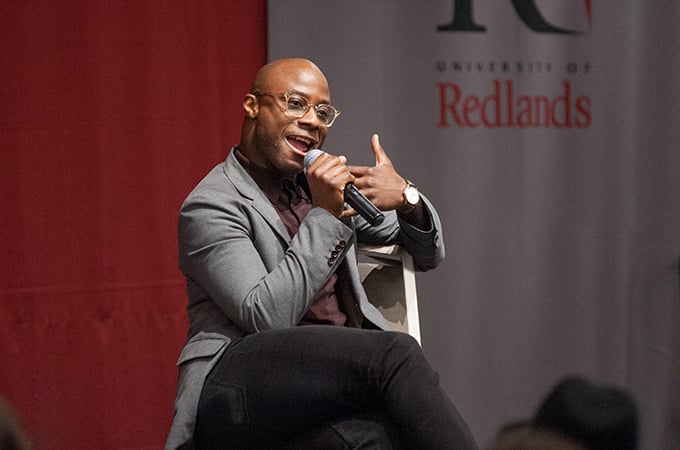On February 26, University of Redlands students, faculty, and community members lined the sidewalks to gain entry to Orton Center on the main Redlands campus. Minutes later, award-winning screenwriter and director Barry Jenkins took the stage to talk about making films, finding inspiration, and creating opportunities for others within the film industry.
“To call Mr. Jenkins distinguished would be an understatement,” said Liran Koropitzer ’19, vice president of the Associated Students of the University of Redlands (ASUR), in her introduction. “I know I speak for many in the Bulldog community when I say that we are honored to have him here tonight.”
Posing questions that students had written before the event, Professor of Race and Ethnic Studies Jennifer Tilton moderated the discussion. Based on the questions, the sources of the director’s inspiration were at the front of students’ minds after the previous night’s screening of Moonlight, an Academy Award-winning film that Jenkins co-wrote and directed.
Throughout the evening, Jenkins, who admitted to nearly dropping out of film school, emphasized the importance of perseverance and the art and community he surrounded himself with as a young filmmaker. Describing how he learned to sign his name in cursive as a child, Jenkins said his autograph reflects his own handwriting, but also the impact of the teacher who taught him how to write it. This, he noted, is how he thinks of the influences on his writing and directing.
“When I first started studying film, I was watching all these foreign art house films,” he said. “So now when people watch my movies, it’s my voice, it’s my signature, but it has other directors’ DNA in it, [too].”
Jenkins released his first feature film, Medicine for Melancholy, five years after he graduated from college. Produced on a $12,000 budget, the film chronicles the one-day romance of two young African Americans in San Francisco. Offering his advice to young filmmakers, Jenkins encouraged members of the audience to make their work personal and to utilize their resources, noting that iPhone cameras now have more pixels than the camera used to film his first movie.
Focusing on this idea, Jenkins noted that technology has increased the affordability of cameras and other film tools and has led to a surge of black screenwriters and directors. For decades, he said, film was used to capture images and films of and about white people, because those were the people who could afford to use film. Now, directors such as Ryan Coogler, who directed Black Panther, and Ava DuVernay of Selma fame are using their talents and resources to tell the stories of people of color.
Over the weekend, Jenkins was named “best director” at the Independent Spirit Awards for his recent adaptation of James Baldwin’s novel If Beale Street Could Talk. In his acceptance speech, he thanked all the women who worked on the film and emphasized their importance within the movie industry—something he reiterated during his talk at the U of R.
“We oftentimes think of progress as a destination and not a direction,” said Jenkins. “At the Academy Awards this weekend, there wasn’t a single woman who was nominated for best director. Does that mean women can’t direct as [well] as men? No. The system is designed to disenfranchise. Progress needs to be continual and gradual, and that starts with recognizing women.”
Jenkins’ upcoming projects include writing and directing a television adaptation of Colson Whitehead’s Pulitzer Prize-winning novel, The Underground Railroad, and writing a screenplay based on the life of Claressa Shields, the first American boxer to with consecutive Olympic medals.
Tilton had the opportunity to ask the final question: given Jenkins has the power to tell any story with film, how does he decide when a story is worth telling?
“It’s all about the characters for me,” he said. “When you make a film, you should always be chasing something. Not a result or an award, but a feeling.”
Learn more about the Associated Students of the University of Redlands and the Race and Ethnic Studies and Media and Visual Culture Studies programs at the U of R.






